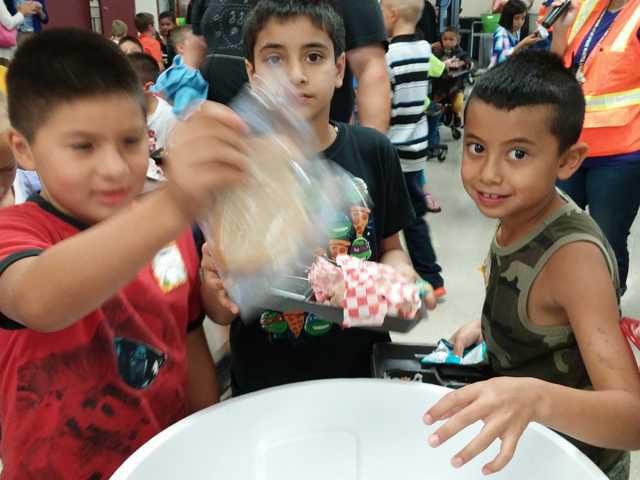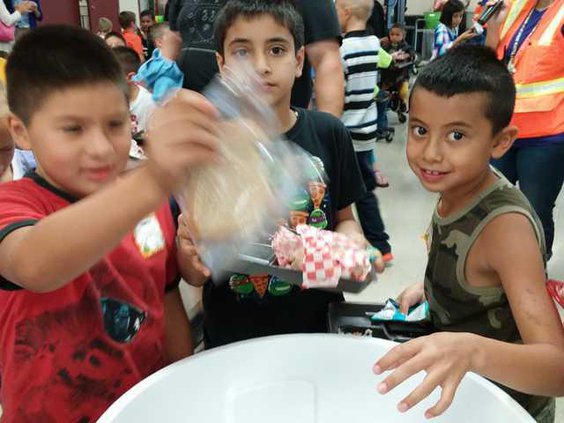Brock Elliott and Joshua Cowell students are learning how to make California greener.
Students at the two Manteca Unified elementary campuses are part of a pilot program to separate food waste from typical school campus trash. It is part of the City of Manteca’s initial efforts to comply with a state mandate that prohibits food waste from being buried in landfills. The first benchmark that cities have to meet in diverting food waste is next year.
Rexie LeStrange – who coordinates the city’s refuse collection services – spoke to the Brock Elliott students Thursday on the first day of school.
She told them the two yard bins – one for trash and the other for discarded foods – would be emptied every day seeking to determine if the throw-away foods from breakfast served in the classrooms and lunch in the cafeteria is contaminated with common trash.
“We’ll be out here monitoring the contamination levels and possibly have to do more education with the students,” LeStrange said.
Five gallon orange buckets will go in every classroom with the word “Food” stenciled on the outside for any leftover breakfast items and crumbs. In the cafeteria there will be a larger container marked “Food” for the same purpose next to a traditional rash container.
LeStrange stressed the need to put straws, cups, napkins and food packages into the trash barrel and “anything that grows on a tree” or bush into the barrel marked “Food.”
“You guys are awesome,” she told the students gathered in the outdoor school quad. “That’s probably why we chose you and Joshua Cowell students to do this program – maybe the only ones in the state.”
She said during the first year the students will be responsible for making compost that will eventually turn into methane gas to make fuel for the city’s garbage trucks.
Much of the responsibility for the refuse collection falls upon head custodian at the school Shane Carpenter who has been with the district for 20 years and for five years at Brock Elliott. He has a staff of three full time workers and one part time. He also coaches basketball and volleyball for boys at Brock Elliott.
The city is working on a plan to develop a facility at the wastewater treatment plant that would turn wet commercial garbage — food waste — into compressed gas to fuel cleaner burning garbage trucks. The city’s 30-truck refuse fleet burns through 1,000 gallons of diesel fuel a day. The conversion process the city is working in would generate 600 gallons of fuel a day. They are working with Tracy to switch recyclables for food scraps in a bid to bridge the gap in fuel production.
Ultimately the 48,000 tons of garbage collected in Manteca that is currently buried each year would be reduced to 28,800 tons of food waste is diverted and made into clean burning fuel.
Under Assembly Bill 1826, by April 2016 all sources that produce 8 cubic yards or more of food waste such as schools, hospitals, and stores that toss out spoiled produce must have their food waste diverted from landfill By January 2017, that threshold drops down to four cubic yard or more. At that point it starts to cover all food stories plus some restaurants. By January 2019, the threshold drops to two cubic yards to take in all restaurants.
Ultimately all residential food waste would have to be diverted from landfills as well.
Students recycle food waste




